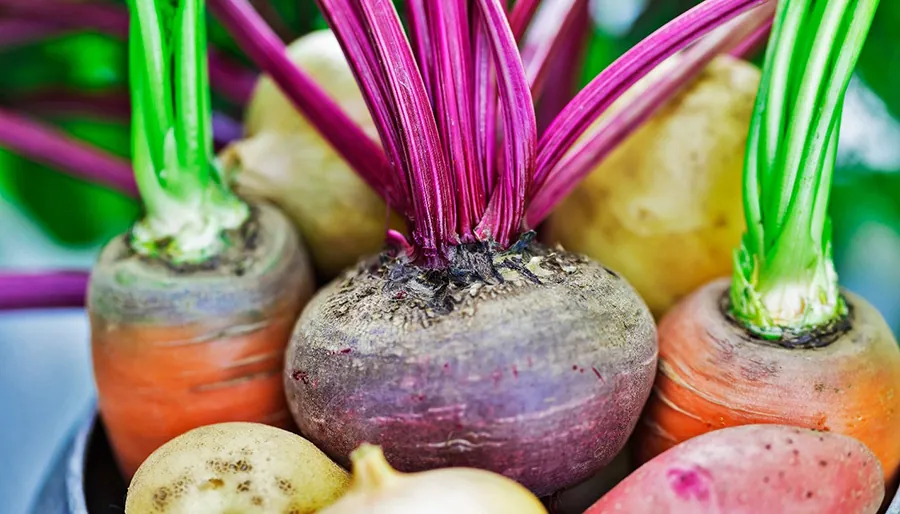Root Vegetables and Exotic Fruits Month: Getting These Superfoods on Your Plate

Winter’s tantalizing coolness has been slowly creeping its way into the northern hemisphere. The solstice today, December 21st, marks the start of the season. Many Americans, especially those in the unforgivingly snowy states, welcome winter with bowls upon bowls of vegetable soup. As these individuals sip a steamy serving of stew, others cope with winter’s madness by daydreaming of a juicy mango on the shores of a sandy beach. Luckily, people on either end of this spectrum can reap incredible health benefits.
Whether or not it was named to accommodate both of the winter coping mechanisms, the fact is that December is recognized as National Root Vegetables and Exotic Fruits Month. Despite seeming polar opposites to one another, root vegetables and exotic fruits have very similar health benefits. Both are filled with vitamins and nutrients to help keep one healthy all winter long. Whether keeping it classic with warm winter dishes or holding on to fruits, which many of us associate with warmer environments, consider incorporating some of these vitamin-rich foods into your winter menu.
Root Vegetables
Root vegetables are simply the underground parts of plants that are consumed by humans. Carrots, potatoes, turnips, parsnips, and rutabagas are just some of the wide variety of these vegetables. Each of these, along with most other root vegetables, are wonderful sources of fiber and vitamins.
Rutabagas, carrots, turnips, and sweet potatoes have a high supply of carotenoids, an organic pigment whose anti-cancer effects were proven by Helmut Sies, M.D., an NFCR-funded scientist for over 30 years. Carotenoids are understood to decrease the risk of eye disease and even certain cancers. They help protect healthy cells against mutation, thereby reducing the risk of cancer development.
Vitamin C, discovered by NFCR’s co-founder, Albert Szent-Györgyi, Ph.D., is also a strong antioxidant that can protect healthy cells from mutation. It is one of the most common vitamins found in root vegetables. In addition to protecting healthy cells, vitamin C is also believed to reduce blood pressure, boost the immune system, and even prevent iron deficiencies.
Exotic Fruits
Many exotic fruits are recognized as superfoods due to their minimal calories and richness in antioxidants and vitamins. For those unsure of where to start with the fruit sampling, the dragon fruit is a great starting point. The skin of a dragon fruit is bright pink, and the inside is white with small black seeds. It’s sweet in taste, comparable to a pear. Similar to root vegetables, dragon fruits and other exotic fruits are filled with fiber, carotenoids, and vitamin C. These characteristics allow for exotic fruits to potentially prevent diseases, boost immune system,s and aid in a healthy gut.
For those feeling more adventurous with exotic fruit samplings, the jackfruit is a tasty yet unique option. Despite having a small resemblance to the flavor of a pineapple, many vegetarians use jackfruit in place of meat. When shredded and barbequed, jackfruit is surprisingly similar to pulled pork! Unlike many other fruits, jackfruit is a source of protein. Increasing protein can repair tissues in the body, but it can also reduce sugar spikes after eating. Though fruits are known for often being very high in sugar, jackfruit may aid in the regulation of blood sugar.
Use of Root Vegetables and Exotic Fruits
Whether keeping warm with winter vegetables or freshening the palate with exotic fruit, these two categories of tasty foods offer great health benefits. Root vegetables are easy to get on the dinner menu by simply roasting them or throwing them in a stew. One of the easiest ways to reap the benefits of exotic fruits is to blend a handful together with some coconut water and make a light smoothie.
Sign-up to Stay Informed About Cancer Research Breakthroughs with NFCR!
References:
- https://www.cdc.gov/flu/season/
- https://www.ncbi.nlm.nih.gov/pubmed/12134711
- https://www.ncbi.nlm.nih.gov/pubmed/2056756
- https://advances.nutrition.org/












